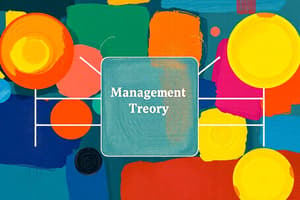Podcast
Questions and Answers
Management is the process of dealing with people or controlling things.
Management is the process of dealing with people or controlling things.
True (A)
The four functions of management are planning, organizing, leading, and evaluating.
The four functions of management are planning, organizing, leading, and evaluating.
False (B)
Objectives in management should be realistic and tied to available resources.
Objectives in management should be realistic and tied to available resources.
True (A)
Interpersonal roles of a manager are strictly related to financial management.
Interpersonal roles of a manager are strictly related to financial management.
Decisional roles include being a disturbance handler and resource allocator.
Decisional roles include being a disturbance handler and resource allocator.
A key to achieving success in management is to dismantle a strong management team.
A key to achieving success in management is to dismantle a strong management team.
Planning in management refers to setting organizational goals effectively.
Planning in management refers to setting organizational goals effectively.
A manager is someone who solely focuses on controlling financial assets.
A manager is someone who solely focuses on controlling financial assets.
The role of a liaison is an example of an informational role.
The role of a liaison is an example of an informational role.
Objectives should be measurable and time-bound to assess their achievement.
Objectives should be measurable and time-bound to assess their achievement.
Flashcards are hidden until you start studying
Study Notes
Nature and Concept of Management
- Management involves the process of overseeing people and resources.
- Focuses on achieving organizational goals effectively and efficiently.
- Utilizes resources such as people, machines, money, time, and systems/techniques.
Four Functions of Management
- Planning: Setting objectives and determining a course of action.
- Organizing: Allocating resources and assigning tasks.
- Leading/Directing: Motivating and guiding employees towards achieving goals.
- Controlling: Monitoring progress and making adjustments as necessary.
Management Aims to Achieve Objectives
- Specific: Objectives should be detailed and clear.
- Measurable: Goals can be tracked and assessed.
- Attainable: Objectives can be achieved through personalized strategies.
- Realistic: Goals must align with current and future resources.
- Time-bound: Goals should be set within a specific timeframe.
Manager Roles
- Definition of a Manager: A person responsible for conducting business or household affairs.
Types of Manager Roles
-
Interpersonal: Focuses on relationships and human skills.
- Figurehead: Represents the organization in ceremonial roles.
- Leader: Directs and motivates team members.
- Liaison: Connects with external parties and stakeholders.
-
Informational: Maintains and develops information networks.
- Monitor: Gathers and analyzes information relevant to the organization.
- Disseminator: Shares information within the organization.
- Spokesperson: Represents the organization and communicates with the public.
-
Decisional: Involves making choices and decisions within the organization.
- Entrepreneur: Initiates new projects and ideas.
- Disturbance handler: Addresses conflicts and unexpected issues.
- Resource allocator: Decides on the distribution of resources.
- Negotiator: Mediates and settles disputes or agreements.
Key to Success
- Assembling a strong and stable management team is crucial for organizational success.
Studying That Suits You
Use AI to generate personalized quizzes and flashcards to suit your learning preferences.




